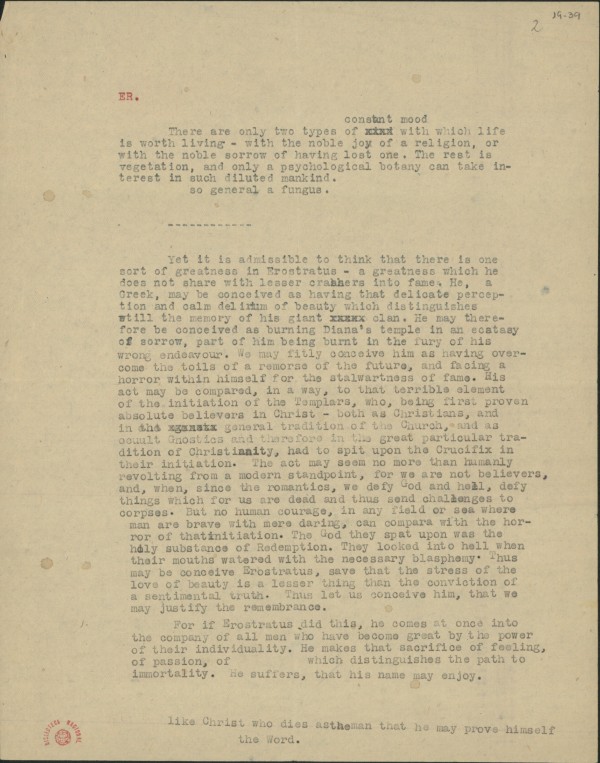Identificação
[19 – 39]
Erostratus.
There are only two types of constant mood with which life is worth living – with the noble joy of a religion, or with the noble sorrow of having lost one. The rest is vegetation, and only a psychological botany can take interest in such diluted mankind.[1]
------------
Yet it is admissible to think that there is one sort of greatness in Erostratus – a greatness which he does not share with lesser crashers into fame. He, a Greek, may be conceived as having that delicate perception and calm delirium of beauty which distinguishes still the memory of his giant clan. He may therefore be conceived as burning Diana’s temple in an ecstasy of sorrow, part of him being burnt in the fury of his wrong endeavour. We may fitly conceive him as having overcome the toils of a remorse of the future, and facing a horror within himself for the stalwartness of fame. His act may be compared, in a way, to that terrible element of the initiation of the Templars, who, being first proven absolute believers in Christ – both as Christians, and in the general tradition of the Church, and as occult Gnostics and therefore in the great particular tradition of Christianity, had to spit upon the Crucifix in their initiation. The act may seem no more than humanly revolting from a modern standpoint, for we are not believers, and, when, since the romantics, we defy God and hell, defy things which for us are dead and thus send challenges to corpses. But no human courage, in any field or sea where men are brave with mere daring, can compare with the horror of that initiation. The God they spat upon was the holy substance of Redemption. They looked into hell when their mouths watered with the necessary blasphemy. Thus may be conceived Erostratus, save that the stress of the love of beauty is a lesser thing than the conviction of a sentimental truth. Thus let us conceive him, that we may justify the remembrance.
For if Erostratus did this, he comes at once into the company of all men who have become great by the power of their individuality. He makes that sacrifice of feeling, of passion, of {…} which distinguishes the path to immortality. He suffers, that his name may enjoy.
{…} like Christ who dies as the man that he may prove himself the Word.
[19 – 39]
Heróstrato.
Existem apenas dois tipos de disposições constantes com as quais a vida é digna de ser vivida – com a nobre alegria de uma religião ou com a nobre tristeza de ter perdido uma. O resto é vegetação e apenas uma botânica psicológica pode ter interesse em tal humanidade diluída.
------------
Contudo, é admissível pensar que existe um tipo de grandeza em Heróstrato – uma grandeza que ele não partilha com figuras menores que atingem a fama. Pode conceber-se que ele, um grego, tinha aquela percepção delicada e aquele calmo delírio de beleza que ainda distingue a memória do seu gigante clã. Pode, por conseguinte, conceber-se que ele tenha queimado o templo de Diana num êxtase de tristeza, sendo parte dele queimada na fúria do seu esforço erróneo. Podemos concebê-lo adequadamente como tendo superado as fadigas do remorso futuro e encarado em si um horror pela firmeza da fama. O seu acto pode ser comparado, de certo modo, àquele terrível elemento da iniciação dos Templários, que, provando primeiramente ser absolutos crentes em Cristo – quer como Cristãos e na tradição geral da igreja, quer como gnósticos ocultos e, portanto, na grande tradição particular da igreja, tinham de cuspir no Crucifixo na sua iniciação. O acto pode parecer não mais do que humanamente revoltante do ponto de vista moderno, pois não somos crentes e quando, desde os românticos, desafiamos Deus e o inferno, desafiamos coisas que para nós estão mortas e, desse modo, lançamos desafios a cadáveres. Mas nenhuma coragem humana, em nenhum terreno ou mar onde os homens são corajosos com a sua mera audácia, pode comparar-se ao horror dessa iniciação. O Deus em que eles cuspiam era a sagrada substância da Redenção. Eles olhavam para o inferno com as suas bocas aguadas com a necessária blasfémia. Assim podemos conceber Heróstrato, salvo que a tensão do amor da beleza é algo menor do que a convicção de uma verdade sentimental. Concebamo-lo deste modo, para que possamos justificar a lembrança.
Pois se Heróstrato fez isto, ele está na companhia de todos os homens que se tornaram grandes pelo poder da sua individualidade. Ele realiza aquele sacrifício do sentimento, da paixão, de {…} que distingue o caminho da imortalidade. Ele sofre para que possa gozar do seu nome.
{…} como Cristo que morre como um homem para que a se possa provar o Verbo.
[1] such diluted mankind. /so general a fungus.\


